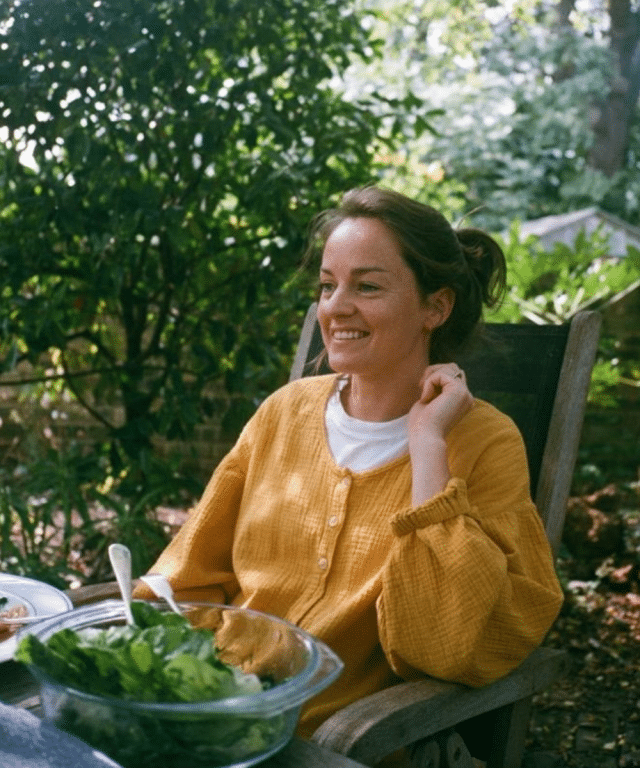
Healthy Soil: Healthy Food – a journey of food, travel and culinary ambition
Lulu Cox embarked on a career in food when she left Bloxham. She began by cooking in a variety of locations, from ski chalets, to Scottish lodges to Mediterranean villas and safari lodges. On returning to the UK and graduating from university, she did a Diploma in Food & Wine in London and then began to work in London restaurants. During her time in restaurants, Lulu built up relationships with farmers and suppliers and began to learn more about the impact holistically farmed food had upon the flavour and quality of ingredients.
This led Lulu to The Land Gardeners where she learnt about regenerative agriculture, and the link between healthy soil, food, humans and the planet. Early this year, Lulu worked on her first publication with The Land Gardeners, The Land Gardeners, Soil to Table. It reflects the link between the health of our soils and the health of our food. This book is filled with ideas and wisdom about how to care for your soil, with wholesome and nutritious recipes from Lulu whose seasonal style of cooking is all about choosing ingredients carefully from farmers and producers who share the same love for the slow food movement.
What was your most memorable time at Bloxham School?
Playing sport! Sport was a huge part of my time at Bloxham and I just loved playing in all the teams – hockey, netball and tennis. I have fond memories of playing tennis at the Park Close courts after lessons in my free time. Another great memory was playing in the 1st XI hockey team with my
sister who was then in Upper Sixth. Bloxham is where I learnt to love sport – being outside, being active, playing in a team and just the endorphins that this delivers.
What advice would you give to students for success in life after Bloxham?
Be in tune with your instincts. Choose what you enjoy and what gives you pleasure. Be kind to friends. Be confident and have faith in whatever path you choose.
What is your most treasured possession?
My cook books. I can’t single out a particular one, but over the years I have built up quite a collection and these give me daily inspiration and fuel my passion.
What has been your greatest professional achievement?
Seeing my recipes published was incredible; it was a really proud moment. Early in my career, I worked in chalets, lodges, and various private households around the world which was a privilege and I feel so fortunate to have done that, but it was very hard work. Equally, working 90-hour weeks in London restaurants was incredibly demanding but it was all about passion and I loved the team environment and being creative – choosing the menu and identifying suppliers and creating personal relationships with them.
When are you happiest?
On the west coast of Scotland – walking and having fun with friends and family. It is such a beautiful part of the world and so peaceful. I love being there and the odd ray of sunshine is always a bonus!
What has been your most memorable adventure?
After University, I worked at five-star safari lodges in Uganda. I was there to teach the chefs new recipes and update and modernise the menus. It was such a remote location and a big challenge – going to the local markets, learning about the local produce, and learning to cook with limited power and equipment. This taught me to think more creatively, and I realised how fortunate I was to have my education as those around me hadn’t been so fortunate. For example, the team I was working with didn’t have access to the internet, or to cook books which obviously makes a huge impact on one’s ability to learn new skills.
Who would you invite to your dream dinner party?
Dame Judi Dench, I recently watched her being interviewed and I think she’s brilliant!
Who or what has been most inspirational to you in your life?
Chef and author Alice Water. She has a wonderful restaurant Chez Panisse in San Francisco which I love and all of her books are fantastic. Alice also runs a non-profit organisation, ‘The Edible School Yard’ which is dedicated to the transformation of public education by using organic school gardens,
kitchens and cafeterias to teach both academic subjects and the values of nourishment, stewardship, and community. Helena Norberg-Hodge is another inspiration. Her approach is seen to some as quite radical. Essentially her question is ‘Why is a carrot grown halfway around the world cheaper than one grown a mile down the road?’ I think it needs to be the future. I think Clarkson is doing a fantastic job of giving insight into the struggles of farming, and the importance of supporting local food systems, I also love Sarah Langford’s book ‘Rooted: How Regenerative Farming Can Change the World’, which I’ve enjoyed listening to on Audible.
What’s the best piece of advice you have received?
An easy life isn’t necessarily a good life – facing challenges makes you learn and ultimately means that you will have access to more opportunities.
Back to all stories

